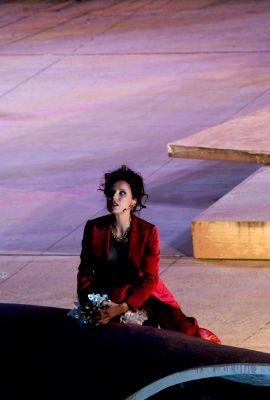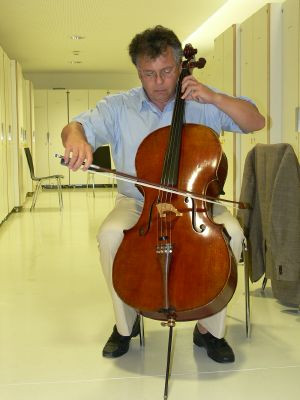|
<<< << -- 3 -- Tess Crebbin A MUST-SEE

As for Nadja Michael, she has also made the change, in her case from mezzo-soprano to soprano and she, also, uses it to her advantage. The occasional mezzo note seems there not by accident but rather, well thought out and precisely placed by Michael, to underline the tragedy of her part. Her 'Vissi d'Arte' stays purely in soprano, of course, and is wretched enough to make you wish you had some influence on God to cause him to have pity on the forlorn creature. Michael changed to soprano in 2005 in Amsterdam with Korngold's Die Tote Stadt, having previously sung all the major mezzo parts at the world's finest opera houses: Vienna, Covent Garden, Milan, to name but a few. Her début as Tosca came in 2005 in St Gall, and shortly afterwards she took over the same part at the Vienna State Opera. At Bregenz, her Tosca was both beautiful and unnervingly naïve, frighteningly dangerous in her murder scene as she brings pure lust for revenge to her stabbing of Scarpia, and powerfully dramatic for the torture scene and the 'Vissi d'Arte'. As for Gidon Saks in the role of Scarpia, his voice is impeccable, as is his dramatic presence, but he is probably not the ideal Scarpia because he is too sympathetic a character while, from Tosca, you really want to come away hating Scarpia. The trouble is, you cannot hate Saks. He is too beautiful, for one, when Scarpia is probably better cast with a less handsome singer. His puppy dog eye approach to Tosca, despite the horrible things he does, evokes pity for a pathetic character torn apart and driven to unspeakable cruelty by his own passion for a woman he cannot have. None of this affects his singing, which was excellent, or his stage presence, which is a feast for the eye, albeit, I personally will never buy him as a hateful character.

Nadja Michael as Tosca. Photo © 2007 Karl Forster
|
All things considered, it was a fine performance and I would concur that it is a must-see, whether this is your first Tosca or your umpteenth, because otherwise you'll really miss out. I doubt anyone is going to forget Todorovich's 'E Lucevan le Stelle', which he sings chained to a wall, the stars overhead and the dark Lake Constance behind him forming the perfect backdrop. Having said that, there are a few shortcomings to be forewarned about if you make your way to Bregenz: the stars are 'stars' and leave immediately after the performance, so forget about the many fans standing outside the stage door pining for an autograph because there will be none. Pre-performance, you can eat a buffet -- and only after paying the horrendously high price are you told that 'buffet' in this case means you are only to go to the buffet once to serve yourself, no seconds allowed. And, of course, there is the rather unfortunate fact that the opera is performed without break, which is good if you did get to eat, drink and visit the rest rooms before you arrived, and not so good if you didn't!

Guenther Thomasberger plays his cello after the performance. Photo © 2007 Philip Crebbin
|
But all these things fade in view of the spectacular performance, about which one should, last but not least, also mention the orchestra, the Vienna Symphony. Excellently conducted, out of view of the lake audience, by Ulf Schirmer, it had a particularly nice cello in it, labelled Rocca and as yet uncertified, played by Professor Guenther Thomasberger. Since none of the stars were available for comment, quotes, or post-performance photograph, we settled for a private midnight solo cello performance on an excellently sounding instrument, and that was well worth the while.
Copyright © 11 August 2007
Tess Crebbin, Munich, Germany

Zoran Todovorich in Profile(Note: in the absence of an interview opportunity, these notes were gathered by Tess Crebbin from the official Bregenz Festival programme and an official release from Volksbank Detmold.) - Beginnings: Born in Belgrade and started singing as a child in the Belgrade Opera Chorus. At the age of twenty, the director of the Belgrade Conservatory stated that he had an exceptionally brilliant voice, and Todovorich came to Western Europe in 1986 to study singing in Frankfurt and Munich, assisted by a scholarship
- First official engagement: 1992, at the 'Landestheater Detmold', where he soon became the star. From 1995-6 firm ensemble member of Niedersaechsiches Landestheater, Hannover
- First international performance: February 1996, in Seville, as Duca in Verdi's Rigoletto
- International breakthrough: Vienna State Opera (Pinkerton in Puccini's Madame Butterfly). Then débuts at Hamburg State Opera as Alfredo (La Traviata), Rodolfo (La Bohème) and Edgadro (Lucia di Lammermoor)
- Career switch: changed from lyric to dramatic tenor around 2004
- Venues: has sung at many of the world's finest opera houses, among them in Vienna, Munich, Berlin, Frankfurt, Zurich, Gent, Madrid, Nice, Amsterdam, San Francisco and Covent Garden
- Bookings: fully booked several years in advance, with three agents: New York, Rome and Zurich
- Next engagements: Don Alvaro (La Forza del Destino, Brussels), Calaf (Turandot, Flemish Opera), Radames (Aida, Palermo), Giasone (Medee, Vienna), Norma and Tosca (Munich), Carmen (Tokyo), Don Carlos and Carmen (Dresden)
- Age: 45
- Away from music: Lives in Blomberg, Germany, with wife Elke, a showjumping rider, and son Luca, on an equestrian estate
- Reputation: some critics count him among the world's top ten tenors
|
BREGENZ FESTIVAL
VIENNA SYMPHONY ORCHESTRA
ZORAN TODOROVICH
NADJA MICHAEL
GIDON SAKS
AN UNUSUAL PERFORMANCE OF 'TOSCA'
TESS CREBBIN TALKS TO CONDUCTOR DAVID STAHL
|

